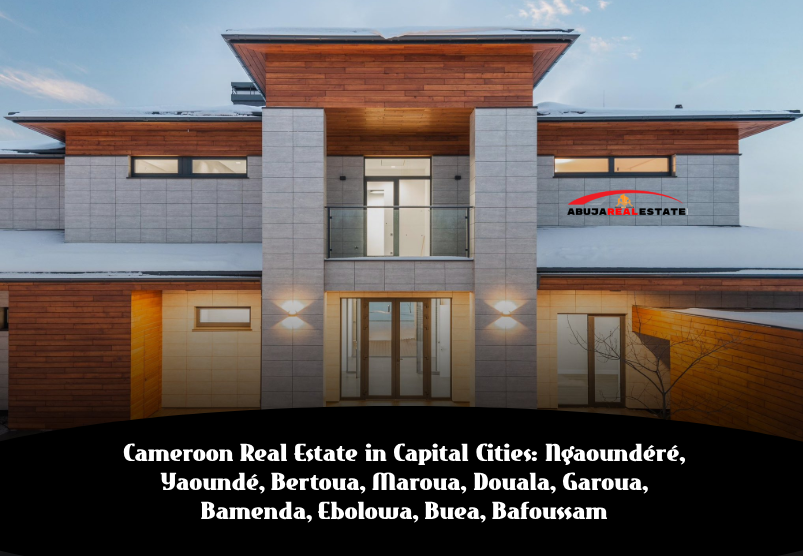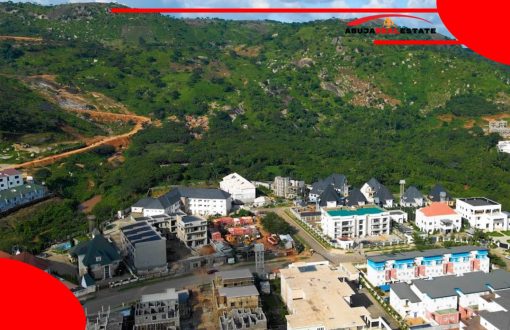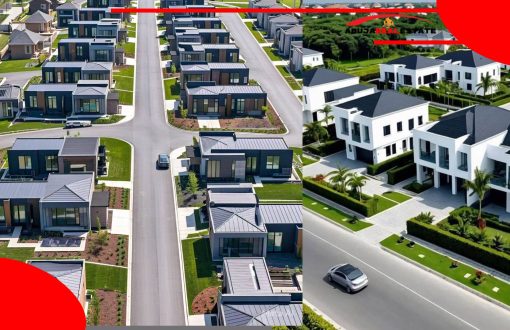Cameroon Real Estate in Capital Cities: Ngaoundéré, Yaoundé, Bertoua, Maroua, Douala, Garoua, Bamenda, Ebolowa, Buea, Bafoussam – All You Need to Know

As a real estate developer and researcher, I welcome you to this in-depth guide focused on real estate opportunities across the key capital cities of Cameroon. Whether you’re an investor, diaspora buyer, or local looking to understand the landscape, this comprehensive overview will walk you through all major urban centers in Cameroon: Ngaoundéré, Yaoundé, Bertoua, Maroua, Douala, Garoua, Bamenda, Ebolowa, Buea, and Bafoussam. From residential zones to commercial opportunities, infrastructure development to land acquisition laws—this is all you need to know before making a move.
Overview of Cameroon’s Real Estate Market
Cameroon, located in Central Africa, boasts a mix of French and English-speaking regions with vibrant urbanization trends. The country’s real estate market is driven by growing population, infrastructure expansion, diaspora remittances, and the increasing demand for affordable housing. Cities like Douala and Yaoundé lead in commercial and political significance respectively, while other capitals offer niche investment opportunities in residential, agricultural, or touristic real estate.
Read Also: Mr. Batoua Silas: 2025 Cameroon Presidential Election Candidate
Why Invest in Cameroon’s Capital Cities
Each capital city in Cameroon is a regional powerhouse. Whether it’s administrative governance, economic activity, or cultural tourism, these cities host institutions, universities, health centers, and industries that drive demand for both residential and commercial properties. The government has been investing heavily in decentralization and regional development, which fuels infrastructure projects such as roads, electricity, and water supply in these capitals—making them ideal for real estate investment.
Ngaoundéré: The Northern Gateway to Growth
As the capital of the Adamawa Region, Ngaoundéré is emerging as a strategic city for logistics and agribusiness. It’s also a key transit point to the northern parts of Cameroon and neighboring Chad. Real estate here is affordable compared to the south, making it attractive for large-scale land acquisition and development.
- Investment Focus: Warehousing, residential plots, and agro-industrial estates.
- Price Trend: Land and housing are still undervalued.
- Challenges: Slower permit processing and infrastructure lag in rural outskirts.
Yaoundé: Political Capital with High-Density Demand
Yaoundé, the political heart of Cameroon, is bustling with government institutions, embassies, universities, and global NGOs. Demand for housing is constantly rising, especially in areas like Bastos, Odza, and Mimboman.
- Investment Focus: Mid- to high-income housing, apartment rentals, serviced offices.
- Price Trend: High per square meter pricing in central zones; affordable plots on the outskirts like Nkoabang.
- Challenges: Congested transport network, strict urban planning regulations.
Bertoua: Untapped Potential in the East

Capital of the East Region, Bertoua is one of the least saturated real estate markets in Cameroon. The city is positioned as a future hub for mining and forest-based industries, making it ideal for speculative land purchases.
- Investment Focus: Future-oriented residential zones, hospitality services.
- Price Trend: Still below market average, with room for appreciation.
- Challenges: Infrastructure development is slower, with high reliance on future government policies.
Read Also: Paul Biya Seeks Eighth Term in 2025 as TikTokers and Critics React
Maroua: Real Estate at the Crossroads of Sahelian Trade
As the capital of the Far North Region, Maroua has strategic cross-border importance with Nigeria and Chad. The city is culturally rich and growing steadily with improved infrastructure and rural-urban migration.
- Investment Focus: Low-cost housing, retail space, border trade-related logistics.
- Price Trend: Very affordable, especially for large land parcels.
- Challenges: Security risks and water scarcity in some districts.
Douala: Cameroon’s Commercial Epicenter
Douala is the economic capital and the largest city in Cameroon. The port, industrial estates, and airport make Douala the most competitive and dynamic real estate zone in the country.
- Investment Focus: High-rise apartments, gated communities, commercial plazas, logistics parks.
- Price Trend: Among the highest in the country, especially in Bonapriso, Akwa, and Bonamoussadi.
Challenges: Traffic congestion, flooding issues, and higher property taxes.
Garoua: Strategic Trade and Agriculture City
Garoua is the capital of the North Region and an essential agricultural and commercial center. It has a functional airport and river port, offering potential for agricultural processing real estate.
- Investment Focus: Agro-based warehouses, workers’ housing, budget retail centers.
- Price Trend: Mid-range, with noticeable annual appreciation.
- Challenges: Seasonal accessibility issues and moderate economic diversification.
Bamenda: Heart of Anglophone Cameroon
As the capital of the Northwest Region, Bamenda is historically significant and holds strong real estate value among English-speaking Cameroonians. Despite socio-political tensions, the demand for housing continues.
- Investment Focus: Townhouses, student housing, and suburban estates.
- Price Trend: Affordable with medium-term price appreciation potential.
- Challenges: Security concerns and slowed administrative functions.
Ebolowa: Quietly Growing Southern Gem
Ebolowa, capital of the South Region, is an agricultural center with increasing urbanization. It’s gaining attention due to road expansion projects and proximity to forest reserves.
- Investment Focus: Green resorts, retirement homes, agricultural estates.
- Price Trend: Still within affordable range.
- Challenges: Limited public utilities and land ownership documentation issues.
Buea: Technology and Education Hub
Buea stands out as the tech capital of Cameroon, home to Silicon Mountain and several universities. It also has scenic mountain views, making it appealing for both residential and hospitality development.
- Investment Focus: Student hostels, tech incubator spaces, eco-tourism lodges.
- Price Trend: Rising steadily, especially in Molyko, Bokwaongo, and Wokoko.
- Challenges: Political instability affecting investor confidence.
Bafoussam: Commercial and Transport Growth
As the capital of the West Region, Bafoussam plays a crucial role in commerce and transportation. The city connects to other key zones and is a trade hub for agricultural goods.
- Investment Focus: Multi-use commercial buildings, transport terminals, storage.
- Price Trend: Affordable with urban zone variation.
- Challenges: Urban sprawl and rising construction material costs.
Understanding the Legal Framework for Real Estate in Cameroon
Cameroon’s land law is based on a hybrid French-English legal system. All land is technically state-owned, but long leases (up to 99 years) are granted. The key documents include:
- Land Title (Titre Foncier): Confers full ownership.
- Lease Agreements: Common for commercial properties.
- Customary Land Rights: Apply in rural and peri-urban areas.
Due diligence is critical. Always verify the title at the local land registry and engage a certified notary for transfer or lease agreements.
Cost of Construction and Development
The cost of construction varies by city and access to materials. For urban zones like Douala and Yaoundé, average building costs range between ₣200,000 to ₣350,000 XAF per m² depending on finish level. In semi-urban zones, costs may be lower due to cheaper labor, though logistics may add to total expenses.
Challenges to Consider Before Investing
While Cameroon holds immense real estate potential, investors should be aware of:
- Bureaucratic Delays: Title processing and permits can take time.
- Land Disputes: Common in peri-urban and inherited properties.
- Political and Economic Uncertainty: Especially in anglophone regions.
- Infrastructure Gaps: In emerging cities like Bertoua or Ebolowa.
Tips for Foreign and Diaspora Investors
- Work with local agents and notaries to navigate procedures.
- Visit the property or send a trusted local representative before purchase.
- Use escrow systems for large transactions.
- Focus on title land, not only customary holdings, for secure long-term investments.
Conclusion
Cameroon’s capital cities offer a mix of risk and reward. For those seeking stability and rental income, Douala and Yaoundé lead the pack. If you’re a long-term investor or speculator, consider emerging markets like Ngaoundéré, Bertoua, or Ebolowa. Real estate in Cameroon is not just about buildings—it’s about understanding local contexts, seizing urbanization trends, and acting with proper legal guidance.


